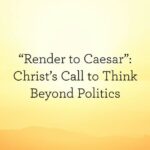In political arguments, there is such a thing a” gotcha “concern– something asked just to push the individual being questioned into stating something that might possibly harm his/her credibility. The strategy isn’t brand-new. It’s at least as old as the New Testament works. In the Gospel of Mark, for instance, we checked out of a group of spiritual and politicians who approached Jesus and asked Him,”Is it legal to pay taxes to Caesar, or not? Should we pay them, or should we not?”(12:14). In Jesus ‘time, this concern was fiercely disputed and traditionally questionable. Rome had actually imposed a tax on Judea in advertisement 6, advising first-century Jews of their subservience to the godless program. The Jews would pay their Roman tax with their Roman currency, the system itself functioning as a seasonal tip of their subjection.
Some within the Jewish neighborhood were referred to as Zealots. Their celebration was among no compromise. They defied Rome, declining to pay taxes to the empire. On the other side of the problem were the Herodians (politicos) and the Pharisees (theologues), who identified there was a method to pay the Roman tax without jeopardizing their convictions.
It was the latter group, the politicos and theologues, who asked Jesus the crammed concern. We can find out a bargain about our relationship to federal government from the high-stakes exchange that followed.
The Approach
Mark explains the setup in the passage’s opening verse: “And they sent out to him a few of the Pharisees and a few of the Herodians, to trap him in his talk.” The “they” of verse 13 are probably the very same infuriated spiritual leaders of verse 12. Looking for another chance to trap Jesus in His words, the group sent out a delegation of Pharisees and Herodians. This unholy band had actually currently approached Christ with spite before (Mark 3:6), which suggests the occasions in chapter 12 were merely the renewal of their efforts to at last silence Jesus.
Their efforts remained in satisfaction of Psalm 2: “The rulers take counsel together, versus the LORD” (v. 2). These odd bedfellows, the political and the spiritual leaders, were unified in their opposition to Jesus– joined together in their desire to damage the Lord of splendor. When we checked out history, we discover this concept emerging once again and once again: the mix of politics and faith to silence Jesus Christ, guaranteeing that the story of the Son of God passing away for guy’s sins is done away with.
We can see the flattery with which this group approached Christ in verse 14, calling Him “Teacher” and acknowledging His willpower to speak plainly and honestly. These information paint an awful photo of humankind’s capability to speak the very best of things from the worst of intentions. Paying lip service to the method of God, they hesitated to do the will of God.
The Reaction
Jesus reacts in verses 15– 17 with 2 concerns and a declaration. He asks a rhetorical concern: “Why put me to the test?” (v. 15). This isn’t the very first time we come across Jesus tested. Back in chapter 8, the Pharisees had actually checked Him on the concern of indications. In chapter 10, the problem was divorce and remarriage. By the time Jesus positioned the concern in chapter 12, He was basically asking, “When are we going to stop this entire ‘gotcha’ concern regimen?”
Mark informs us that Jesus then asked for a denarius and positioned a useful concern. We can picture him turning the denarius backward and forward in His hand, analyzing it thoroughly while those collected analyzed Him, then asking, “Whose similarity and engraving is this?” (vv. 15– 16). “Caesar’s,” they responded– and in no uncertain terms, Jesus then addressed the leaders’ preliminary concern: “Render to Caesar the important things that are Caesar’s.” To put it simply: “Yes, pay the Roman taxes.”
Jesus puts politics in its location, setting our responsibility to state within the boundaries of our higher task to God.
The Roman denarius was a little silver coin, comparable to the American quarter in both worth and in size. On the coin was Tiberius Caesar Augustus and underneath his image the title “Son of the magnificent Augustus.” On the back was a picture of Tiberius seated on the throne, crowned with a diadem, dressed as a high priest. It was an apparent token of Caesar’s unequaled guideline.
This made Jesus’ response even more intriguing. With His reaction, Jesus refuted the Zealot ideology, which tried to develop a sort of “nation within the nation.” There were obligations associated with becoming part of the Roman Empire, Jesus was acknowledging– part of which involved paying the tax. “So, pay the tax,” Jesus stated.
Jesus continued, advising them to render likewise “to God the things that are God’s” (v. 17). Simply as Tiberius’s image was marked onto the denarius, so the image of God is marked onto the lives of those whom He’s produced. And while the Jews because context had an obligation to pay the Roman tax, these commitments were within the context of their supreme duty to the living God. Jesus here puts politics in its location, setting our task to any momentary state within the boundaries of our higher task to the everlasting, sovereign God.
The concerns of political flexibility aren’t the supreme concerns of life. We require just to consider our Christian bros and sis in locations like Somalia, Libya, or Northern India, who understand little political liberty however take excellent enjoy God’s kingdom. For the follower, the main problem isn’t the world’s kingdoms. It’s the kingly guideline of the Lord Jesus.
The Response
The leaders’ reaction is tape-recorded for us in one sentence: “They admired him” (Mark 12:17). Having actually concerned question Jesus intellectually, they discover themselves taken a look at. In trying to trap Him, they were faced with the truth (whether they recognized it or not) that there’s no sanctuary from Him; there’s just haven in Him by faith– a truth the self-righteous delegates hesitated to accept.
The concerns of political liberty aren’t the supreme concerns of life.
From this passage, we can obtain a couple of concepts for living as double residents, with homes developed within a geopolitical border and a citizenship that belongs eventually in paradise (Phil. 3:20).
Political programs take a far-off 2nd location when we end up being disciples of Jesus. Think about 2 of Jesus’ apostles: Matthew, previously a tax collector for Rome, and Simon, who came from the celebration of the Zealots. Matthew was a “huge federal government” guy, Simon a “no federal government” guy. And yet where do we discover them unified? In the kingdom of Christ! Our political goals are necessary however not supreme. They’re secondary to Jesus’ kingship.
Second, there are limitations to the honor that is due Caesar. When pushed to stop their preaching in Acts, the apostles responded, “We need to comply with God instead of guys” (Acts 5:29). The state’s jurisdiction is to be honored, however it’s likewise restricted. What’s due Caesar is tax. What’s not due Caesar is praise. We do not render to Caesar those things which are entirely God’s. The Christian admits, “Christ, not Caesar, is Lord.”
The kingdom of Christ takes precedence over every other kingdom. No matter just how much we enjoy where we’re from, we belong eventually to the kingdom over which Christ rules, which is consisted of individuals from all the countries of the world under His authority.
The kingdom of Christ takes precedence over every other kingdom.
What, then, is our self-confidence? Where is our nerve? How are we to think of the world in which our grandchildren will live– a world that we can’t even develop? There’s just one response, and it’s to see today political sphere in relation to the future truth that will trigger us to state, “The kingdom of the world has actually ended up being the kingdom of our Lord and of his Christ, and he will rule permanently and ever” (Rev. 11:15).
This post was adjusted from the preaching “‘Render to Caesar …’” by Alistair Begg.

![]()











